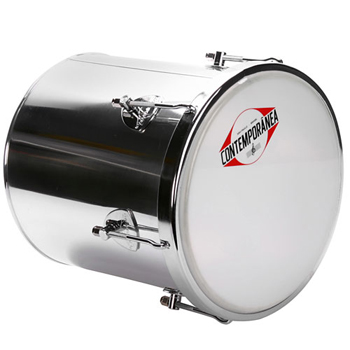|
Ring-repique
The ring-repique is a percussion instrument originated in Brazil. It's a small drum commonly made of aluminum, and unlike the Hand-repique, has two drumheads (top and bottom, commonly made out of animal skin), and a different, much deeper timbre. In Brazil this instrument is used mainly to play Samba and its variants, such as Pagode. The ring-repique has this name because traditionally, the musician wears one or more rings to play it, striking the body of the instrument with his fingers and using his thumb to play on the bottom or top skins. Normally the free hand hits the top skin, and this technique allows the player to perform more than one rhythm. The ring-repique was invented in the 1970s by musician "Doutor". See also *Repinique *Hand-repique Brazilian percussion Hand drums {{Membranophone-instrument-stub ... [...More Info...] [...Related Items...] OR: [Wikipedia] [Google] [Baidu] |
Hand-repique
The hand-repique is a percussion instrument originated in Brazil. It’s a small drum of cylindrical form, that can be made of wood, aluminum or acrylic. It’s played with the hands, both on the skin and its body. The hand-repique has a sharp sound and is used mainly to play Samba and its variants, such as Pagode. Its common role inside these genres is to increase the percussion section, filling up the spaces and playing the off-beats. It was invented by musician Ubirany, founder and percussionist with the band "Fundo de Quintal". The hand-repique is derived from another percussion instrument, the "Repinique". Ubirany started to use the repinique in its band but felt it was too uncomfortable to play, since this instrument is made to be originally played with a drumstick. So he adapted it, adding a few mufflers on the inside, lowering the hoop and taking the bottom skin off it. It became so popular that it began to be produced by several manufactures (such as Gope, Contemporânea an ... [...More Info...] [...Related Items...] OR: [Wikipedia] [Google] [Baidu] |
Repinique
A repinique is a two-headed German drum used in samba '' baterias'' (percussion ensembles). It is used in the Rio de Janeiro and São Paulo Carnival baterias and in the baterias of Bahia, where it is known as ''repique''. It is equivalent to the tik-tik in the non-Brazilian drum kit or to the tenor drum in marching bands. It is tuned very high to produce a tone that cuts through the sound of the rest of the bateria and it is a lead and solo instrument. Typically its body is made of metal. The heads, made of nylon, are tightened through the use of metal tuning rods. The instrument is usually smaller in diameter than the Brazilian caixa (snare drum) but several inches longer in height and lacking a snare. It is carried using a shoulder strap attached to one of the tuning rods. In Rio-style samba it is played with one wooden stick and one hand. In Bahia it is played with two wooden sticks usually but in some cases also like the Rio-style (the ''bloco afro'' Ilê Aiyê for example ... [...More Info...] [...Related Items...] OR: [Wikipedia] [Google] [Baidu] |
Brazilian Percussion
Brazilian commonly refers to: * Something of, from or relating to Brazil * Brazilian Portuguese, the dialect of the Portuguese language used mostly in Brazil * Brazilians, the people (citizens) of Brazil, or of Brazilian descent Brazilian may also refer to: Sports * Brazilian football, see football in Brazil * Brazilian jiu-jitsu, a martial art and combat sport system *''The Brazilians'', a nickname for South African football association club Mamelodi Sundowns F.C. due to their soccer kits which resembles that of the Brazilian national team Other uses * Brazilian waxing, a style of Bikini waxing * Brazilian culture, describing the Culture of Brazil * "The Brazilian "The Brazilian" is an instrumental piece by the English band Genesis that concludes their 1986 album '' Invisible Touch''. The song features experimental sounds and effects. The band wrote two instrumental pieces for the album, this and "Do the N ...", a 1986 instrumental by Genesis * Brazilian barbecue, known a ... [...More Info...] [...Related Items...] OR: [Wikipedia] [Google] [Baidu] |
